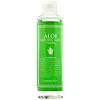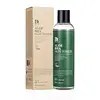What's inside
What's inside
 Key Ingredients
Key Ingredients

 Benefits
Benefits

 Concerns
Concerns

 Ingredients Side-by-side
Ingredients Side-by-side

Aloe Barbadensis Leaf Juice
Skin ConditioningWater
Skin ConditioningGlycerin
Humectant1,2-Hexanediol
Skin ConditioningSodium Hyaluronate
HumectantBeta-Glucan
Skin ConditioningSnail Secretion Filtrate
Skin ConditioningPortulaca Oleracea Extract
Skin ConditioningPsidium Guajava Fruit Extract
AstringentAllantoin
Skin ConditioningZanthoxylum Piperitum Fruit Extract
Skin ConditioningPulsatilla Koreana Extract
Skin ConditioningUsnea Barbata Extract
Polysorbate 80
EmulsifyingAlthaea Rosea Flower Extract
Skin ConditioningAloe Barbadensis Leaf Extract
EmollientCamellia Sinensis Leaf Extract
AntimicrobialHydroxyethylcellulose
Emulsion StabilisingNonoxynol-14
Disodium EDTA
Parfum
MaskingAloe Barbadensis Leaf Juice, Water, Glycerin, 1,2-Hexanediol, Sodium Hyaluronate, Beta-Glucan, Snail Secretion Filtrate, Portulaca Oleracea Extract, Psidium Guajava Fruit Extract, Allantoin, Zanthoxylum Piperitum Fruit Extract, Pulsatilla Koreana Extract, Usnea Barbata Extract, Polysorbate 80, Althaea Rosea Flower Extract, Aloe Barbadensis Leaf Extract, Camellia Sinensis Leaf Extract, Hydroxyethylcellulose, Nonoxynol-14, Disodium EDTA, Parfum
Aloe Barbadensis Leaf Water
MaskingWater
Skin ConditioningButylene Glycol
HumectantGlycerin
HumectantDipropylene Glycol
HumectantPentylene Glycol
Skin Conditioning1,2-Hexanediol
Skin ConditioningAloe Barbadensis Leaf Juice
Skin ConditioningSodium Hyaluronate
HumectantPortulaca Oleracea Extract
Skin ConditioningPsidium Guajava Fruit Extract
AstringentAspalathus Linearis Extract
Skin ConditioningCynanchum Atratum Extract
Skin ConditioningSalicylic Acid
MaskingPerilla Ocymoides Leaf Extract
TonicSchisandra Chinensis Fruit Extract
Skin ConditioningAcorus Calamus Root Extract
PerfumingAloe Barbadensis Leaf Extract
EmollientAlthaea Rosea Root Extract
HumectantPolyglutamic Acid
Skin ConditioningBeta-Glucan
Skin ConditioningArginine
MaskingAllantoin
Skin ConditioningCitrus Paradisi Fruit Extract
Skin ConditioningCaprylyl Glycol
EmollientC12-14 Pareth-12
EmulsifyingAcrylates/C10-30 Alkyl Acrylate Crosspolymer
Emulsion StabilisingXanthan Gum
EmulsifyingAloe Barbadensis Leaf Water, Water, Butylene Glycol, Glycerin, Dipropylene Glycol, Pentylene Glycol, 1,2-Hexanediol, Aloe Barbadensis Leaf Juice, Sodium Hyaluronate, Portulaca Oleracea Extract, Psidium Guajava Fruit Extract, Aspalathus Linearis Extract, Cynanchum Atratum Extract, Salicylic Acid, Perilla Ocymoides Leaf Extract, Schisandra Chinensis Fruit Extract, Acorus Calamus Root Extract, Aloe Barbadensis Leaf Extract, Althaea Rosea Root Extract, Polyglutamic Acid, Beta-Glucan, Arginine, Allantoin, Citrus Paradisi Fruit Extract, Caprylyl Glycol, C12-14 Pareth-12, Acrylates/C10-30 Alkyl Acrylate Crosspolymer, Xanthan Gum
 Reviews
Reviews

Ingredients Explained
These ingredients are found in both products.
Ingredients higher up in an ingredient list are typically present in a larger amount.
1,2-Hexanediol is a synthetic liquid and another multi-functional powerhouse.
It is a:
- Humectant, drawing moisture into the skin
- Emollient, helping to soften skin
- Solvent, dispersing and stabilizing formulas
- Preservative booster, enhancing the antimicrobial activity of other preservatives
Allantoin is a soothing ingredient known for its protective and moisturizingg properties. Because of this, it is often added to products with strong active ingredients.
Studies show higher concentrations of this ingredient can promote wound healing.
Though it can be derived from the comfrey plant, allantoin is produced synthetically for cosmetic products to ensure purity.
Learn more about AllantoinAloe Barbadensis Leaf Extract is an extract of the leaves of the aloe, Aloe barbadensis, Liliaceae.
Aloe is one of the most well-known natural soothing ingredients, and for good reason. It’s full of water and has a cooling, calming effect on the skin, especially when it’s sunburned, itchy, or irritated. Aloe also helps your skin stay hydrated and smooth by mimicking what healthy skin naturally produces. On top of that, it contains vitamins and nutrients that support skin recovery.
It doesn’t protect you from the sun, but it can help your skin bounce back after too much time in it.
Let’s get into the details:
Aloe contains antioxidant Vitamins A, C, and E, which help fight off free radicals (unstable molecules from things like pollution that can damage your skin).
It’s also rich in polysaccharides, which are natural sugars that help hydrate the skin by acting like the skin’s own moisturizing agents. These, along with other sugars like monosaccharides, help form a protective barrier that locks in moisture.
Aloe works as both a humectant and an emollient. That means it draws water into the skin (humectant) and helps trap it there (emollient), making it an effective natural moisturizer.
You’ll also find a mix of other skin-supporting ingredients in aloe, including folic acid, choline, calcium, amino acids, fatty acids, and even Vitamin B12.
Out of the 420+ species of aloe, Aloe barbadensis is the most widely used in skincare products thanks to its gentle yet effective properties.
There are over 420 species of aloe but Aloe Barbadensis is the most commonly used for topical products.
Learn more about Aloe Barbadensis Leaf ExtractAloe Barbadensis Leaf Juice comes from leaves of the aloe plant. Aloe Barbadensis Leaf Juice is best known for helping to soothe sunburns. It is also anti-inflammatory, moisturizing, antiseptic, and can help heal wounds.
Aloe is packed with good stuff including Vitamins A, C, and E. These vitamins are antioxidants, which help fight free-radicals and the damage they may cause. Free-radicals are molecules that may damage your skin cells, such as pollution.
Aloe Barbadensis Leaf Juice also contains sugars. These sugars come in the form of monosaccharides and polysaccharides, folic acid, and choline. These sugars are able to help bind moisture to skin.
It also contains minerals such as calcium, 12 anthraquinones, fatty acids, amino acids, and Vitamin B12.
Learn more about Aloe Barbadensis Leaf JuiceBeta-Glucan is a polysaccharide. It can be derived from the cell walls of seaweed, oats, yeast, and fungi. It hydrates the skin and helps boost your skin's natural barrier.
As an antioxidant, beta-glucan helps fight free-radicals. Free-radicals are molecules that may damage your skin cells, such as pollution.
Studies show this ingredient may be an effective wrinkle reducer as it can deeply penetrate into skin. It has also been show to help with wound healing.
Learn more about Beta-GlucanGlycerin is already naturally found in your skin. It helps moisturize and protect your skin.
A study from 2016 found glycerin to be more effective as a humectant than AHAs and hyaluronic acid.
As a humectant, it helps the skin stay hydrated by pulling moisture to your skin. The low molecular weight of glycerin allows it to pull moisture into the deeper layers of your skin.
Hydrated skin improves your skin barrier; Your skin barrier helps protect against irritants and bacteria.
Glycerin has also been found to have antimicrobial and antiviral properties. Due to these properties, glycerin is often used in wound and burn treatments.
In cosmetics, glycerin is usually derived from plants such as soybean or palm. However, it can also be sourced from animals, such as tallow or animal fat.
This ingredient is organic, colorless, odorless, and non-toxic.
Glycerin is the name for this ingredient in American English. British English uses Glycerol/Glycerine.
Learn more about GlycerinThis extract comes from Purslane, a succulent. It has anti-inflammatory, antioxidant, and hydrating properties.
Purslane is very nutritious. It contains omega-3 fatty acids, NMFs, many vitamins, minerals, and antioxidants. The vitamins found in purslane include: Vitamin C, Vitamin A, and Vitamin E.
Fun fact: Purslane is a succulent with an extensive habitat. It is used in traditional Korean medicine to treat irritated skin.
Nowadays, purslane is becoming a superfood due to its highly nutritious content.
Learn more about Portulaca Oleracea ExtractWe don't have a description for Psidium Guajava Fruit Extract yet.
Sodium Hyaluronate is hyaluronic acid's salt form. It is commonly derived from the sodium salt of hyaluronic acid.
Like hyaluronic acid, it is great at holding water and acts as a humectant. This makes it a great skin hydrating ingredient.
Sodium Hyaluronate is naturally occurring in our bodies and is mostly found in eye fluid and joints.
These are some other common types of Hyaluronic Acid:
Learn more about Sodium HyaluronateWater. It's the most common cosmetic ingredient of all. You'll usually see it at the top of ingredient lists, meaning that it makes up the largest part of the product.
So why is it so popular? Water most often acts as a solvent - this means that it helps dissolve other ingredients into the formulation.
You'll also recognize water as that liquid we all need to stay alive. If you see this, drink a glass of water. Stay hydrated!
Learn more about Water